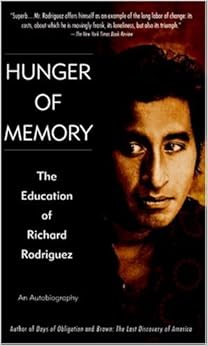Richard Rodriguez was born into a Spanish-speaking family. Though that may have acted as a handicap at the start of his schooling, he graduated from Stanford, Columbia, and UC Berkeley; his writing can now be found in well-respected magazines around the world. This essay is a memoir that focuses on the role of heritage and family language in the development of individuality. The essay is a protest against bilingual education (cited as a way to preserve heritage and identity) - Rodriguez writes, "while one suffers a diminished sense of private individuality by being assimilated into public society, such assimilation makes possible the achievement of public individuality" (par. 38). His basic argument is that simply isolating one's heritage is not enough to create a unique identity, but rather children need to feel comfortable in public society before they can build their own identities.
Rodriguez also describes how his assimilation into public society naturally led to a separation from his family life. He explains, "As we children learned more and more English, we shared fewer and fewer words with our parents" (par. 32). This use of antithesis highlights the idea that leaving behind one's private identity is necessary to build one's public identity, and therefore grow up. This message is hinted at in the beginning: "I turned to see my mother's face dissolve in a watery blur behind the pebbled-glass door" (par. 3). The use of imagery makes the statement stand out, and foreshadows his separation from his parents.
Rodriguez also describes how his assimilation into public society naturally led to a separation from his family life. He explains, "As we children learned more and more English, we shared fewer and fewer words with our parents" (par. 32). This use of antithesis highlights the idea that leaving behind one's private identity is necessary to build one's public identity, and therefore grow up. This message is hinted at in the beginning: "I turned to see my mother's face dissolve in a watery blur behind the pebbled-glass door" (par. 3). The use of imagery makes the statement stand out, and foreshadows his separation from his parents.
Rodriguez successfully argues his position without forcing a straightforward persuasive essay, instead using pathos and narrative to support his argument. I personally connected with the essay because I am bilingual and do have a "home" and "school" language. Although I do not remember quite as much of a struggle between the two, I can empathize with the resulting separation from parents and the preference to keep the two languages separate. I agree with Rodriguez's argument that making the student feel comfortable in society is necessary to build a respectable identity. And one of the best ways to do this is, of course, to make them learn the public language.
 |
| The essay discussed above was taken from Richard Rodriguez's autobiography, "Hunger of Memory." The book reflects upon his simultaneous acceptance into the intellectual community and separation from his family culture. (Source: Amazon) |

